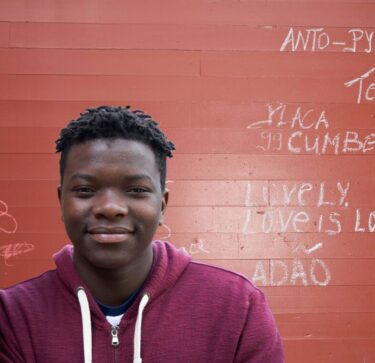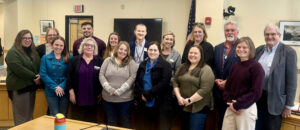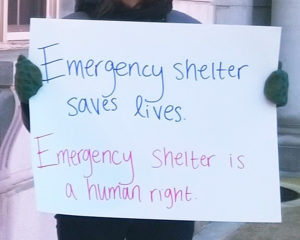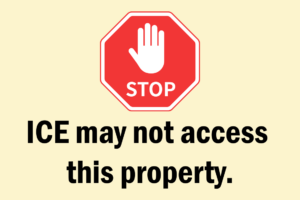Much like the Street Outreach Collaborative but with a focus on youth, Preble Street’s Teen Outreach Specialists provide resources and basic needs to young people living outside. Though Preble Street is exploring ways to continue this lifesaving program, it is likely coming to an end or will have its services dramatically cut.
On July 9, Preble Street and other nonprofits across the country received the devastating news that the U.S. Department of Health and Human Services decided to consolidate stand-alone funding for street outreach to unsheltered youth into other awards. This effectively destroys a vital resource to prevent and rapidly respond to youth homelessness, abuse, and trafficking. Preble Street’s Teen Outreach program received $150,000 annually from this grant.
Each year, the Preble Street Teen Outreach program serves approximately 150 young people in York and Cumberland counties who are experiencing unsheltered homelessness, couch surfing, or are otherwise difficult to find or engage. The team conducts weekly on foot outreach routes in Portland, Biddeford, Sanford, and Old Orchard Beach.
There is no question that our Teen Street Outreach program saves lives. Outreach workers meet youth where they are — camping on the periphery of towns and cities, sleeping on the beach during the tourist season, or sleeping in their car in a Walmart parking lot. They build trust to connect young people to safety and services.

“The lack of available resources makes the job difficult,” says elliott, Preble Street Teen Outreach Specialist. “I think the most important part of the work is the healthy and authentic relationship you model and build with youth. You ‘move at the speed of trust’ (adrienne maree brown), and to the best that circumstances allow, co-create a sense of security in us to have their back in a world that has already failed them. We act as a bridge to their next steps: responding to what goals clients identify in their plan of care while providing life-sustaining food, water, clothing, and camping supplies, meeting them where they’re at in all ways possible. You collaborate in response to their goals – ground up, from communities to providers to systems, offering clients choices. With a trauma-informed approach and to generate sustainability, you then act on what clients want for themselves, accompanying the youth in their processes.”
Teen Services Street Outreach Specialists may be the only adult an unhoused youth has been able to trust. As part of building relationships, caseworkers also offer opportunities for young people they meet to “just be a kid”. Whether that’s buying and playing with a toy or a squishmallow dubbed “Charles Pickle” while stocking up on supplies at the store, or skateboarding together while chatting. These chances for joy and comfort make a difference.
“A lot of these kids have had to grow up really fast and have been taking care of themselves for a long time in really hard, dangerous situations — many of which most adults will not face in their lifetime,” says elliot. “Our teen outreach clients are learning to step into their power, and they are survivors. They deserve compassion, respect, and all we can offer.”
Outreach workers do what no other program does: they meet youth where they are — on the streets — and build trust to connect them to safety and services before abuse or trafficking occurs. Eliminating funding for this program takes away the safety and stability that all young people in Maine deserve.
“We are experiencing a homelessness crisis in the state and in this country. And if we’re not able to fund, for a very small amount, these preventative efforts for youth homelessness, then my fear is that adult homelessness across this country will only continue to grow in the coming years,” said Leah McDonald, Senior Director of Social Work at Preble Street.
Other youth homelessness programs also at risk
Outreach is one important part of the system of care that has been developed to support young people experiencing difficult, unsafe, or unstable situations.
Other key programs that are funded by a grant from the Runaway and Homeless Youth Act support thousands of young people each year through emergency shelter, transitional housing, and supportive services for youth and young adults.

Each year when grant applications open, organizations have 60 days to turn in the complicated narratives and paperwork required as part of the application. This year when the grant cycle opened, providers were notified they had only 19 days to apply. “That’s a 77% reduction in time for one of the most complex and essential federal grant programs serving young people.”
Teens and young adults find themselves living on the streets for a myriad of reasons. Often they are escaping unsafe living situations or their families are also unhoused. Without dedicated outreach staff to help them stay safe and navigate the complicated systems of care, they are at major risk of continued homelessness, abuse, and trafficking. The continual dismantling of the social safety net is harming all of us, including Maine’s most vulnerable youth.
How you can help
– We need more landlords to partner with Preble Street to house youth. Youth in our housing programs are supported by caseworkers who visit at least weekly, and there are often financial incentives we can offer to landlords in this program. Email landlordshelp@preblestreet.org for more information.
– Donations of funds allow Preble Street to respond quickly to rapidly changing situations. You can make a gift at preblestreet.org/donate.
– Donations of material items (tents, clothing, sunscreen, etc.) can be made through our partner Maine Needs. They have an updated list of what is most needed.
– Advocate! Tell your elected officials that our local, state, and federal officials need to protect the programs that protect us all!

Preble Street testimony in support of permanent, sustainable funding for Maine emergency shelters
Maine needs and deserves safe, accessible, professionally run, and sustainable emergency shelters that can meet the needs of the growing number of individuals and families experiencing homelessness in our state. On Tuesday, February 10, 2026, shelter executive directors and staff from across the state went to Augusta to advocate for a sustainable funding source that

Take Action: Tell Maine to provide permanent funding for emergency shelters!
Depending on where a person lives in our state, they may need to travel hours to the nearest shelter if they become homeless. There is no guarantee that when they arrive there will be a bed available. Right now, there are not enough shelter beds in Maine for the thousands of individuals and families experiencing

TAKE ACTION to Protect Maine’s Public Schools, Hospitals, Daycares, and Libraries from ICE
Tell your Maine legislators to support LD 2106! Increased presence of Immigration and Customs Enforcement (ICE) agents, as part of the dehumanizingly named ‘Operation Catch of the Day,’ is creating constant fear and anxiety for so many of our neighbors, leaving them scared to leave their homes, go to work, take their children to school, seek
